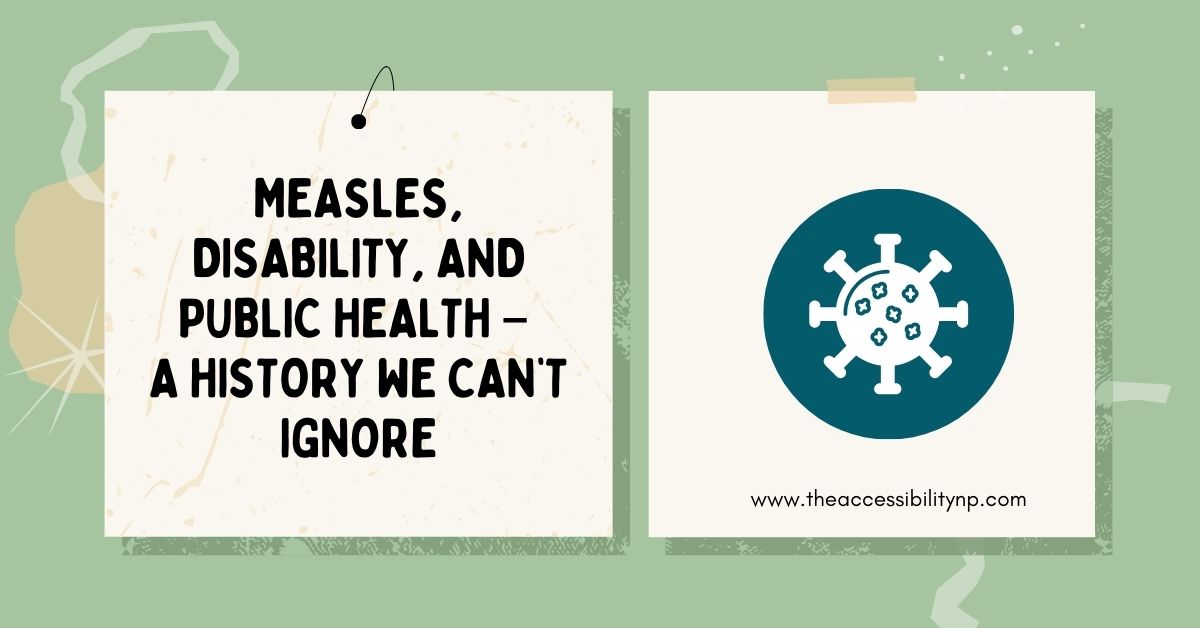Trigger Warning: This article discusses the historical and current impact of measles, including disability, severe illness, and loss of life. If this topic is difficult for you, please take care while reading.
Understanding Measles and Its Impact
Measles is often thought of as a childhood illness that comes and goes, but for some, it has life-changing consequences. While most people recover, measles can lead to serious complications, including hearing loss, vision impairment, cognitive disabilities, and neurological disorders. These outcomes can create lifelong barriers to communication, education, and independence.
The purpose of this discussion is not to instill fear but to acknowledge the connection between measles and disability from a public health and disability advocacy perspective. Understanding this historical and current link is essential to ensuring that disabled individuals are included in conversations about health policy, public health preparedness, and long-term support systems.
Measles Cases in the United States: A Five-Year Overview
Measles was declared eliminated in the U.S. in 2000 due to high community immunity. However, cases have fluctuated in recent years, with notable increases in 2024 and early 2025.
- CDC Measles Information
- 2020: 13 cases
- 2021: 49 cases
- 2022: 121 cases
- 2023: 59 cases
- 2024: 285 cases
- 2025 (as of March 13,, 2025): 301 cases
These numbers reflect the importance of continued public health awareness and accessible healthcare responses, especially for those most vulnerable to complications.
The Dismissiveness of Measles
A common reaction to discussions about measles is dismissiveness, with people saying things like, “I had measles as a child and I was fine” or “It’s just a rash.” While it is true that many people recover without serious complications, this perspective overlooks the reality that not everyone has the same experience with measles.
For those who have lasting complications, this kind of dismissiveness can feel invalidating. It also ignores the historical and medical realities of measles.
What these comments fail to acknowledge:
- Not everyone recovers the same way. Some people experience severe complications, including brain swelling (encephalitis), deafness, blindness, and immune suppression that leads to secondary infections.
- Survivorship bias plays a role in these comments. Those who had mild cases or fully recovered may not realize how many others experienced long-term disabilities or even died from measles.
- Medical advancements have changed the risks. While healthcare today is better equipped to treat complications, that doesn’t mean everyone will avoid serious outcomes.
- These statements dismiss those who have suffered long-term consequences. Many individuals and families have had their lives permanently altered due to measles-related disabilities.
A more inclusive and responsible approach to discussing measles is recognizing that each person’s experience is different and that public health discussions should include those who have faced serious complications.
Measles and Disability: A Historical Perspective
Before Vaccines: A Preventable Disability Crisis
Before the introduction of vaccines, measles was a nearly universal childhood illness. Most children recovered, but for thousands, it caused long-term disabilities.
- In the 1700s and 1800s, measles outbreaks devastated communities, particularly those with limited medical access.
- In 1912, the U.S. began tracking measles cases. An average of 6,000 people died from measles every year, with many survivors experiencing permanent disabilities.
- By the 1950s, hospitals reported high numbers of children with deafness, blindness, intellectual disabilities, and seizure disorders as a result of measles complications.
At the time, there were no legal protections ensuring disabled individuals had access to education, employment, or support services. Many children affected by measles-related disabilities faced systemic exclusion from schools and workplaces.
How Measles Can Cause Permanent Disabilities
While measles is primarily a respiratory virus, it can have lasting neurological and sensory effects that permanently alter an individual’s life.
Neurological Complications and Cognitive Disabilities
A rare but serious complication of measles is encephalitis, or inflammation of the brain. This occurs in about one in every 1,000 measles cases and can result in:
- Memory loss and cognitive delays
- Seizure disorders and epilepsy
- Motor impairments, including paralysis or difficulty coordinating movements
Some children appear to recover from measles only to develop subacute sclerosing panencephalitis (SSPE) years later. SSPE is a fatal degenerative brain condition that progressively impacts motor skills, cognitive function, and communication.
Hearing Loss
Measles is a leading cause of preventable childhood deafness. The virus can damage the inner ear, leading to permanent hearing loss.
For many families in the pre-vaccine era, access to sign language education, assistive technology, or communication support was limited, leaving deaf individuals isolated in schools and workplaces.
National Association of the Deaf: Understanding Hearing Loss
Vision Impairment and Blindness
Measles can lead to vision loss or complete blindness, typically due to corneal scarring or severe infections that damage the eyes. This was especially common in children with vitamin A deficiencies, but even otherwise healthy children could experience permanent vision damage from the virus.
In the past, many individuals who became blind due to measles struggled to access education and employment, as few systems were in place to support their needs.
American Printing House for the Blind: Vision Loss and Accessibility
The Immune System and Secondary Infections
Even after recovery, measles weakens the immune system for weeks or months, increasing vulnerability to secondary infections. Children who experience these complications may require long-term medical care or ongoing support for chronic health conditions.
For children with complex medical needs, this immune suppression can result in severe illness or hospitalizations long after the measles infection has cleared.
Measles and Disability Rights
The introduction of the measles vaccine in 1963 drastically changed public health outcomes. Cases of measles-related disabilities declined, and by 2000, the U.S. declared measles eliminated.
For a time, measles-related disabilities seemed to be a concern of the past. But with cases rising again, these risks are re-emerging.
This raises critical disability rights questions:
- Will healthcare systems ensure accessible and inclusive care for individuals impacted by measles-related complications?
- Will schools and public services be prepared to support children who develop hearing loss, vision impairment, or cognitive disabilities due to measles?
- Will public health discussions include disabled individuals in decision-making processes?
Historically, disabled individuals have often been excluded from public health conversations. Ensuring that disability advocacy is part of public health planning helps prevent unnecessary barriers and ensures equal access to healthcare, education, and community participation.
Final Thoughts
Measles is not just a temporary illness. It has historically been a leading cause of preventable disabilities, affecting thousands of individuals’ lives. As cases increase, it is crucial to consider the long-term implications for those affected and ensure that the disability community is part of public health conversations.
This is not about pushing fear but about ensuring access, inclusion, and the right to a future without unnecessary barriers.
For more discussions on disability advocacy, follow @TheAccessibilityNP.

